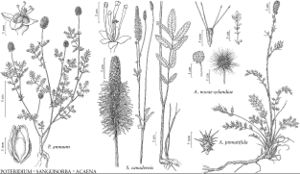Difference between revisions of "Acaena novae-zelandiae"
Trans. & Proc. New Zealand Inst. 3: 177. 1871.
FNA>Volume Importer |
imported>Volume Importer |
||
| (5 intermediate revisions by 2 users not shown) | |||
| Line 10: | Line 10: | ||
|special_status={{Treatment/ID/Special_status | |special_status={{Treatment/ID/Special_status | ||
|code=F | |code=F | ||
| − | |label= | + | |label=Illustrated |
}}{{Treatment/ID/Special_status | }}{{Treatment/ID/Special_status | ||
|code=I | |code=I | ||
| Line 34: | Line 34: | ||
|elevation=0–200 m | |elevation=0–200 m | ||
|distribution=Calif.;Oreg.;Pacific Islands (New Guinea;New Zealand);Australia;also introduced in Europe (England;Ireland). | |distribution=Calif.;Oreg.;Pacific Islands (New Guinea;New Zealand);Australia;also introduced in Europe (England;Ireland). | ||
| + | |introduced=true | ||
|discussion=<p>Herbarium records of <i>Acaena novae-zelandiae</i> are from the coastal ranges in California, Humboldt and Sonoma counties, around San Francisco and Monterey, and in Oregon.</p><!-- | |discussion=<p>Herbarium records of <i>Acaena novae-zelandiae</i> are from the coastal ranges in California, Humboldt and Sonoma counties, around San Francisco and Monterey, and in Oregon.</p><!-- | ||
--><p><i>Acaena novae-zelandiae</i> has noxious weed status in the United States. The name A. anserinifolia (J. R. Forster & G. Forster) Druce was misapplied to <i>A. novae-zelandiae</i> by P. A. Munz (1968), this being the first published record of the taxon from North America.</p> | --><p><i>Acaena novae-zelandiae</i> has noxious weed status in the United States. The name A. anserinifolia (J. R. Forster & G. Forster) Druce was misapplied to <i>A. novae-zelandiae</i> by P. A. Munz (1968), this being the first published record of the taxon from North America.</p> | ||
| Line 44: | Line 45: | ||
-->{{#Taxon: | -->{{#Taxon: | ||
name=Acaena novae-zelandiae | name=Acaena novae-zelandiae | ||
| − | |||
|authority=Kirk | |authority=Kirk | ||
|rank=species | |rank=species | ||
| Line 59: | Line 59: | ||
|publication title=Trans. & Proc. New Zealand Inst. | |publication title=Trans. & Proc. New Zealand Inst. | ||
|publication year=1871 | |publication year=1871 | ||
| − | |special status= | + | |special status=Illustrated;Introduced;Weedy |
| − | |source xml=https:// | + | |source xml=https://bitbucket.org/aafc-mbb/fna-data-curation/src/2e0870ddd59836b60bcf96646a41e87ea5a5943a/coarse_grained_fna_xml/V9/V9_530.xml |
|subfamily=Rosaceae subfam. Rosoideae | |subfamily=Rosaceae subfam. Rosoideae | ||
|tribe=Rosaceae tribe Agrimonieae | |tribe=Rosaceae tribe Agrimonieae | ||
Latest revision as of 22:57, 5 November 2020
Plants creeping or stoloniferous. Stems to 15 dm, 1.5–2 mm diam.; branches erect, short, leafy. Leaves: stipules 3–5-fid; petiole 0.3–1 cm; blade 2–11 cm, leaflets 4–7 per side, bright shining green, oblong or elliptic, 4–17 mm, margins crenate-dentate, teeth 8–15, smooth adaxially, abaxial surface glaucescent, usually pilose on veins and margins, adaxial sparsely pilose. Scapes axillary, 10–15 cm, 1–2 mm diam., smooth, lacking both cauline leaves and multicelled hairs. Inflorescences 80–100-flowered, globose heads (9 mm diam. in flower, 20–35 mm diam. in fruit); bracteoles linear, pilose. Flowers 3.5 mm diam.; sepals 4, triangular, 1.5 mm, abaxially pilose, adaxially glabrous; stamens 2(or 3), filaments 1.5–2 mm, anthers white; stigma white, fimbriate. Fruiting hypanthia obtriangular, 3.5–5 mm diam., surfaces sericeous, 4-angled, each angle with a slender spine at apex, red, sometimes lemon yellow, 7–12 mm, spines with 4–10 translucent, retrorse barbs 0.5 mm at apex, surfaces glabrous. 2n = 42 (New Zealand).
Phenology: Flowering May–Jun.
Habitat: Roadsides and paths, forest edges, logged lands, lawns, among cultivated ground covers and waste grounds
Elevation: 0–200 m
Distribution

Introduced; Calif., Oreg., Pacific Islands (New Guinea, New Zealand), Australia, also introduced in Europe (England, Ireland).
Discussion
Herbarium records of Acaena novae-zelandiae are from the coastal ranges in California, Humboldt and Sonoma counties, around San Francisco and Monterey, and in Oregon.
Acaena novae-zelandiae has noxious weed status in the United States. The name A. anserinifolia (J. R. Forster & G. Forster) Druce was misapplied to A. novae-zelandiae by P. A. Munz (1968), this being the first published record of the taxon from North America.
Selected References
None.
